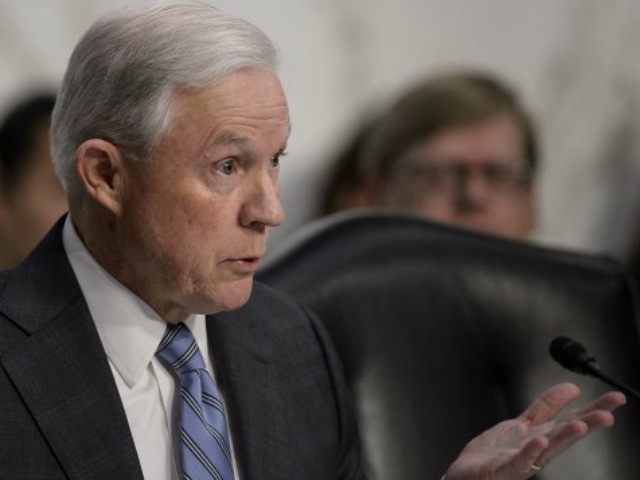Sen. Jeff Sessions (R-AL), the chairman of the Senate Judiciary Committee’s Subcommittee on Immigration and the National Interest, is calling for the immediate destruction of the 5,554-page Trans-Pacific Partnership (TPP) trans-global trade deal introduced on Thursday.
“The text of the Trans-Pacific Partnership runs 5,554 pages,” Sessions said in a statement provided to Breitbart News.
This is, by definition, anti-democratic. No individual American has the resources to ensure his or her economic and political interests are safeguarded within this vast global regulatory structure. The predictable and surely desired result of the TPP is to put greater distance between the governed and those who govern. It puts those who make the rules out of reach of those who live under them, empowering unelected regulators who cannot be recalled or voted out of office. In turn, it diminishes the power of the people’s bulwark: their constitutionally-formed Congress.
In the next part of the detailed statement calling for the TPP’s annihilation, Sessions walks through several troubling rules and regulations contained throughout its thousands of pages.
Among the TPP’s endless pages are rules for labor, environment, immigration and every aspect of global commerce – and a new international regulatory structure to promulgate, implement, and enforce these rules,” Sessions said. “This new structure is known as the Trans-Pacific Partnership Commission – a Pacific Union – which meets, appoints unelected bureaucrats, adopts rules, and changes the agreement after adoption.
Sessions added that the text of this deal—which is actually bigger than Obamacare and the Senate “Gang of Eight” amnesty bill combined—“confirms” Americans’ “fears” about it, specifically the creation of a new global governance structure similar to the European Union.
Sessions says:
“The text of the TPP confirms our fears, plainly asserting: ‘The Parties hereby establish a Trans-Pacific Partnership Commission which shall meet at the level of Ministers or senior officials, as mutually determined by the Parties,’ and that ‘the Commission shall’:
· ‘consider any matter relating to the implementation or operation of this Agreement’;
· ‘consider any proposal to amend or modify this Agreement’;
· ‘supervise the work of all committees and working groups established under this Agreement’;
· ‘merge or dissolve any subsidiary bodies established under this Agreement in order to improve the functioning of this Agreement’;
· ‘seek the advice of non-governmental persons or groups on any matter falling within the Commission’s functions’; and
· ‘take such other action as the Parties may agree’.
Further, the text explains that ‘the Commission shall take into account’:
· ‘the work of all committees, working groups and any other subsidiary bodies established under this Agreement’;
· ‘relevant developments in international fora’; and
· ‘input from non-governmental persons or groups of the Parties’.
Sessions goes on to note that the new global governance structure is “open-ended” and has no bounds.
Sessions says:
This global governance authority is open-ended: “The Commission and any subsidiary body established under this Agreement may establish rules of procedures for the conduct of its work.” It covers everything from the movement of foreign nationals: “No Party shall adopt or maintain…measures that impose limitations on the total number of natural persons that may be employed in a particular service sector. . . in the form of numerical quotas or the requirement of an economic needs test”; to climate regulation: “The Parties acknowledge that transition to a low emissions economy requires collective action.”
Sessions compares the enormous size of the deal to Jonathan Swift’s epic novel, Gulliver’s Travels, and argues that Americans are elevating third world bureaucrats to their level in an unfair way that empowers the elites of the world—effects on ordinary people be damned.
“These 5,554 pages are like the Lilliputians binding down Gulliver,” Sessions said.
They will enmesh our great country, and economy, in a global commission where bureaucrats from Brunei have the same vote as the United States. Clearly, powerful forces will have their voices heard and find ways to profit immensely from this conglomeration. But what of everyday wage-earning Americans? By nearly a 5:1 margin, they believe such deals reduce wages – not increase them. Because this deal lacks currency protections, it will further the bleeding of U.S. manufacturing jobs overseas, allowing our mercantilist trading partners to take advantage of our continued refusal to protect our own workers.
Sessions said this isn’t just a “trade agreement” or even a full-fledged treaty. It’s the creation of a new global governing structure akin to the European Union—one that cedes U.S. sovereignty to a yet-to-be-created international governing body.
“At bottom, this is not a mere trade agreement,” Sessions said. “It bears the hallmarks of a nascent European Union. It is another step towards a world where people, goods, and services can travel freely across international boundaries – and a world where those boundaries mean less and less every day.”
Sessions also called for the immediate repeal of Trade Promotion Authority (TPA)—or fast track—which will, if this deal follows the fast track barely approved earlier this year, grease the skids ensuring its passage. Senators are powerless to stop the massive deal if the deal is on the fast-track.
Yet, because Fast-Track – or so-called Trade Promotion Authority – was adopted (without a single vote to spare), we cannot amend this deal, we cannot filibuster this deal, and we cannot subject it to the two-thirds treaty vote,” Sessions said. “That is why I am calling today on our leaders to take the TPP off of the Fast-Track. The vote should be held under regular Senate and Constitutional order, and it should be held when voters can hold their lawmakers accountable – not during an unaccountable lame duck session.

COMMENTS
Please let us know if you're having issues with commenting.